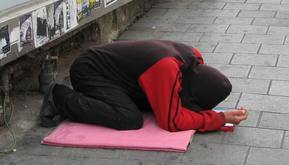On my recent journey to Israel, one of the oddities of Tel Aviv was the sighting of the occasional beggar on the street. These seemed to take 3 forms: old women sitting beside lamp-posts, elderly hasidic pan-handlers with a bit of a crazy edge, and young penitents who situate themselves in a state of frozen prostration, on the leeward side of walkways.
This is an strange sight to see.
In North American cities, begging and pan-handling are synonymous – considered by the more cozy financially to be one of society’s major blights, sore spots.
The poor and the beggars have always been with us, in one form or another — at least in the so-called “civilized” societies of the post-tribal world. One imagines that in “tribal” times, all people had meaningful roles to play in societies where life wasn’t measured by accumulation and prestige.
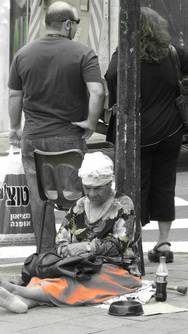
The artifice of our societies says that money means life, and those without, or those who refuse to ride that bandwagon, are marginalized, cast aside, humiliated, dis-empowered. It’s a challenge for us, who “have”, to be in contact with our fellow humans, who “have not”. Do we give, what do we give, how much do we give, does our giving sustain their addictions… and on and on.
These strange-looking young men on prayer mats, facing mecca, seem to be asking for something, with the gesture of their outstretched hand. And what they seem to be asking for is “money”. I’m not sure if money is looked upon as an answer, a remedy, or a poultice – a relief mechanism. Whatever the case, it seems to grease the Squeaky Wheel of needs that arise in a culture full of fragmented souls.
When I think of the mid-east in general, and what it represents in our western psyche, it seems to be a melting pot of religiosity, conflict, mayhem, violence, dire end-day predictions and powerful political and economic maneuvering. As well, two predominant races of traumatized people, each trying desperately to define and maintain a somewhat ambiguous heritage by drawing – literally – lines in the sand, and daring their neighbor NOT to step over them. What seems overly apparent, to one who has finally walked in that fertile desert, is that, like all people of all races world-wide, these two races simply want to live in peace and get on with life. In fact, celebrate, enjoy, sing, dance … they way they’ve done for centuries.
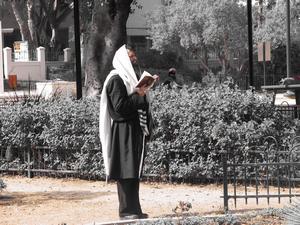 What becomes apparent is that it’s not the common people who want war, it’s the common people who want peace. Somewhere in the upper echelons, in both camps, are the perpetrators of war, violence, greed, animosity – of course all spoken in the sacred name of “religion”, but all ignoring the fundamental of all religions: that life is the most sacred commodity.
What becomes apparent is that it’s not the common people who want war, it’s the common people who want peace. Somewhere in the upper echelons, in both camps, are the perpetrators of war, violence, greed, animosity – of course all spoken in the sacred name of “religion”, but all ignoring the fundamental of all religions: that life is the most sacred commodity.
And somehow, because of the tainted, contrived and corrupted media we’re exposed to in the West, we end up conjuring up visions of an entire society at war. Perhaps this is what “they” want us to believe, “they” who thrive on sparks, gasoline and fire. “They” who lie because truth is neither a fundamental of mainstream media nor of mainstream religion, except on paper.
When considering beggars and begging, through my privileged intellect, one thing becomes apparent. Begging for joy, for peace, for tranquility, for fulfillment, would seem to me to be the highest and most beautiful standard for “us”, the street-people of Planet Earth. In our preoccupation with accumulation and our strategies of positioning ourselves, we’ve estranged ourselves from the most beautiful parts of our own soul: our humanity, our compassion, our consciousness.
Kabir puts it very succinctly: “I have not come here to settle down…” He hints at the impermanence of things: mainly us. And he also hints at the beauty of knowing the permanent – within the heart of this temple of the transient – as the most worthwhile pursuit in life. 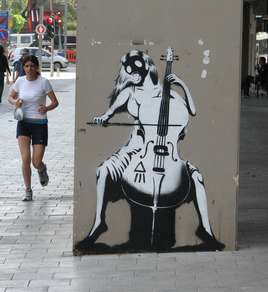
The beggars on the walk-way: if a person really loved themselves, would they put themselves through this hardship, this humiliation? Would God ask us to hate ourselves, or hurt ourselves… does He need that? Can hatred and hurting ever be a path to the divine, or is this simply another facet of our modern deluded psyches? And even if some healthy self-mutilation was essential to run a religion economically, would money falling in the outstretched hand help the situation at all? Seriously, these young beggars look quite fit, robust even – no lack of meat on the bone.
Perhaps god needs the money.
Or war needs the money. Or missiles need the money. Or people who twist our perceptions of life need the money. Or money needs money. Lies need more lies to feed the lies. If you starve the lies, will truth emerge from falsehood’s emaciated form?
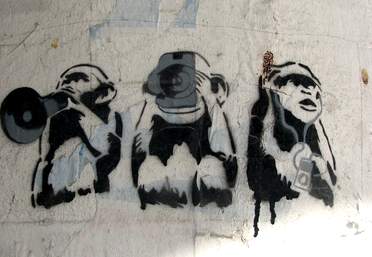
In a world so bereft of humanity, gentleness, kindness, sweetness … what promises does Money make to us? What wrongs does it right? What hunger does it feed, and more importantly, what thirst does it end?
Whether it’s “money in the name of god”, or “money in the name of drugs” or money for Caesar or money for the Virgin Mary, it’s all the same. This pouring of water has gone down the drainpipes of humanity ceaselessly, for untold time.
 And, for all the its ills it has created, there have been few it has cured. And humanity’s games go on.
And, for all the its ills it has created, there have been few it has cured. And humanity’s games go on.
The beggars keep begging. And the bombs keep falling. And the religions and politicians who keep making promises, keep breaking the same promises. For mouths that pronounce the word “Peace” in thousands of dialects, through thousands of years, the blood on Jerusalem’s walls attests to the fact that words mean nothing, and money passes on from hand to mouth to anus and it all ends up in the same worthless place.
And peace?
Real peace?
This timeless ingredient is also known, by those who have met the true Teacher. Like all the immutable principals of life itself, this one gift has always been attainable, and always will be. The simple and sacred temple of “within” – a temple that no religion can claim, a temple that no bomb can decimate, a thirst that money will neither feed nor starve.
Owned by none other than you. Abandoned and ignored by none other than you. And waiting patiently, for none other than you.




